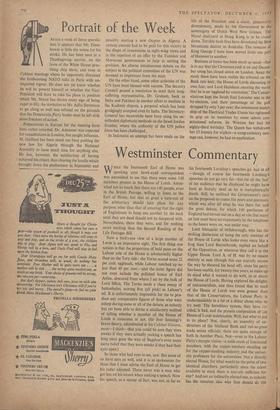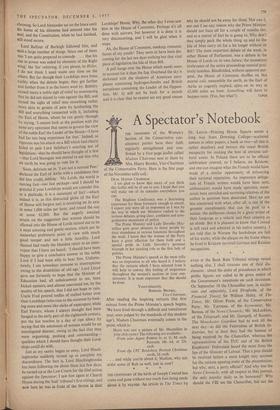Westminster Commentary
VVNILE the fourteenth Earl of Home was speaking your hawk-eyed correspondent was astonished to see that there were some 140 members present in the House of Lords. Aston- ished not so much that there are 140 people, even in the British Peerage, willing to listen to the Earl of Home, but that so great a turn-out of the aristocracy should take place for any purpose other than that of ensuring that the right of Englishmen to hang one another by the neck until they are dead should not be tampered with. Nevertheless, there they were, and for nothing more exciting than the Second Reading of the Life Peerages Bill.
Now a bird's-eye view of a large number of Lords is an impressive sight. The first thing one notices is that the proportion of bald pates on the Labour side of the House is substantially higher than on the Tory side : the Tories scored some 22 per cent. eggheads, while Labour notched up no less than 40 per cent.—and the latter figure did not even include the polished bonce of Earl Attlee, obscured from where I sat by the bulk of Lord Silkin. The Tories made a clean sweep of buttonholes, scoring five (all pink) .to Labour's nil. It is unfortunately impossible for me to pro- duce any comparative figures of those who were asleep during some or all of the debate, as nobody has yet been able to devise a satisfactory method of telling whether a member of the House of Lords is conscious or not. (Sir Ivor Jennings's brave theory, adumbrated in his Cabinet Govern- ment—I think—that you could be sure they were awake if they were actually making a speech has long since gone the way of Bagehot's even more naive belief that they were awake if they had their eyes open.)
So those who had eyes to see, saw. But some of us have ears as well, and it is as spokesman for these that I must advise the Earl of Home to get his radar adjusted. There never was a man who got less on his screen when making a speech. Now his speech, as a matter of fact, was not, as far as his fourteenth Lordship's speeches go, bad at all —though of course his fourteenth Lordship's speeches do not go very far—but for all the 'feel' of his audience that he displayed he might have been as literally deaf as he is metaphorically dumb. Still, he outlined the Government's case on the proposals to create life peers and peeresses, which was after all what he was there for, and the great debate, for which 140 gentlemen of England had turned out on a day so vile that many an heir must have sat expectantly by the telephone as the hours wore on, was under way.
Lord Alexander of Hillsborough, who has the striking distinction of being the only member of the House of Lords who looks even more like a frog than Lord Beaverbrook, replied on behalf of the Opposition, or whatever they call it in the Upper House. Lord A. of H. was by no means entirely at ease (though this can scarcely excuse the way he shouted his head off), since his party has been unable, for twenty-two years, to make up its mind what it wanted to do with, to or about the House of Lords. Having explored the delights of unicameralism, and then found that its need • of the House of Lords was even greater than that of the Conservatives, the Labour Party is understandably in a bit of a dither about what to try next. The hereditary system, they have (:.?- cided, is bad, and the present composition of the House of Lords indefensible. Well, but what to put in its place? Not, clearly, an assembly of ex- directors of the Midland Bank and out-to-grass trade• union officials; there are quite enough of both in Another Place. Not—even to the Labour Party's myopic vision—a mish-mash of functional members, with the copper-smelters standing up for the copper-smelting industry,and the univer- sity professors for the universities. Not a directly elected House, for what would be the point of two identical chambers, particularly since the talent available to stock them is scarcely sufficient for one? And not an indirectly-elected one, as nobody has the remotest idea who then should do the
choosing. So Lord Alexander sat on the fence until the horns of his dilemma had entered into his soul, and the Constitution, when he had finished, still stood secure.
Lord Balfour of Burleigh followed him, and said a large number of things. Since one of them was 'I am quite prepared to concede . . . that his rise to power was aided by elements of the Right Wing,' the 'his' referring, if you please, to Hitler, I do not think 1 need waste any time on the others. But far though their Lordships were from reality when the debate began, they got farther and farther from it as the hours went by. Bobbity caused many a noble sigh of relief by announcing that he did not intend to vote against the Bill, and turned the sighs of relief into something rather more akin to groans of pain by lambasting the Bill and everything connected with it, including the Earl of Home, whom he ran gently through by saying, 'I cannot look at the position with the same airy optimism that seems to govern the view of the noble Earl the Leader of the House—I have had far too long experience for that.' Indeed, so vigorous was his attack on a Bill which had clearly failed to pass Lord Salisbury's exacting test of legislation—that he should have thought of it first —that Lord Stansgate was moved to ask him why on earth he was going to vote for it.
Soon, delirium set in. 'I am not a normal Peer,' declared the Earl of Airlie with a candidness that did him credit, adding : 'My Lords, the world is moving fast—too fast perhaps—and I should be grateful if your Lordships would not consider this as a platitude; it is a statement of fact'—which Indeed it is, as this distracted globe (if the Earl of Home will forgive me) is revolving on its axis at some 1,000 miles per hour, and round the sun at some 62,000. But the eagerly awaited attack on the suggestion that women should be allowed into the House of Lords turned out to be a most amusing and gentle oration, which put its somewhat prehistoric point of view with much good temper and not a little humility. Lord Samuel had ready the blandest retort to an inter- rupter that I have yet heard : 'I should have been happy to give a conclusive answer to the noble Lord if I had been able to hear him. Unfortu- nately, I am nowadays immune to interruptions owing to the disabilities of old age.' Lord Lloyd gave me furiously to hope that the Minister of Education had, all unbeknownst to me, been kicked upstairs, and almost convinced me, by the quality of his speech, that I did not hope in vain. Uncle Fred poured oodles of melted butter over their Lordships (who rose to the occasion by look- ing more and more like sticks of asparagus), while Earl Ferrers, whom I always thought had been hanged in the early part of the eighteenth century, put the last touches to a day of ripe idiocy by saying that the admission of women would be an unmitigated disaster, owing to the fact that they were organising, pushing and commanding— qualities which I should have thought their Lord- ships could do with.
Just as my sanity began to sway, Lord Hinch- ingbrooke suddenly turned up to complete my discomfiture. The fact is, Lord Hinchingbrooke has been following me about these last few days; he turned up at the Law Courts for the libel action against the Spectator; I saw him again at Church House during the 'leak' tribunal's first sittings, and now here he was in front of the throne in their
Lordships' House. Why, the other day I even saw him in the House of Commons. Perhaps it's all done with mirrors, but however it is done it is very disconcerting, and I will be glad when it stops.
Ah, the House of Commons, madcap, romantic haunt of my youth! They seem to have been dis- cussing for the last ten days nothing but that vital piece of legislation the Isle of Man Bill.
A pall hangs over the House which needs more to account for it than the fog. Overhead the sky is darkened with the shadows of American aero- planes containing hydrogen-bombs and British aeroplanes containing the Leader of the Opposi- tion. Mr. G will not be back for a month and it is clear that he cannot see any good reason
why he should not be away for three. Nor can I; nor can I see any reason why the Prime Minister should not buzz off for a couple of months too, and as a matter of fact he is going to. Why don't they simply pack the whole thing up and let the Isle of Man carry on for a bit longer without its Bill? The most important debate of the week, in either House of Parliament, was a debate in the House of Lords on its own future; the monstrous irrelevance of the entire proceedings seemed posi- tively tasteless. Blindfolded, without apparent pur- pose, the House of Commons shuffles on this mortal coil; meanwhile the earth, as the Earl of Airlie so cogently implied, spins on its way at 62,000 miles an hour. Something will have to















































 Previous page
Previous page